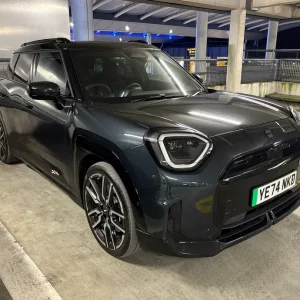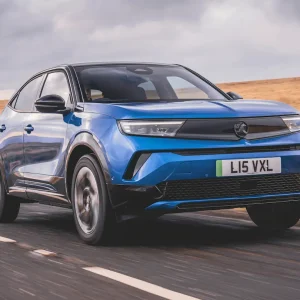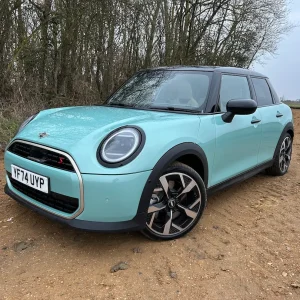A legacy of the old era of General Motors ownership, the Mokka was developed in Korea as a model for Chevrolet, and in Europe it was badged as Vauxhall and Opel as Chevrolet had withdrawn from the region.
With platform-sharing deals agreed with French automotive giant PSA (now the even bigger Stellantis following the recent Fiat-Chrysler merger), Vauxhall’s Crossland X was a hurried makeover of the original Peugeot 2008, and the Grandland X a more sober interpretation of the Peugeot 3008.
The Crossland has now been updated, but it still has its origins in the earlier vehicle architecture. The new Mokka is underpinned by the platform that gave us the impressive second-generation Peugeot 2008 a year ago.
That means that as well as petrol and diesel versions, the Mokka-E (like the Peugeot E-2008) offers an all-electric version.
It also debuts a new look for Vauxhall models, with a distinctive front end that the updated Crossland is mimicking and we can expect to see on the next Astra when it’s unveiled later in 2021.
These things are subjective, of course, but if this is a sign of Vauxhalls to come, they could have many more company car drivers interested in having them.
We’ll take a closer look at the petrol Mokka in the future, but the electric version seems worthy of attention first.
Like its group relatives the DS 3 Crossback E-Tense and Peugeot E-2008, the Mokka-E comes with a 136hp (100kW) electric motor and just falls short of the E-2008’s range with 201 miles.
The Mokka-E comes with a 50kWh lithium-ion battery and its motor is capable of producing 192lb-ft of torque instantaneously, but the driver doesn’t need to have it all at once.
Customers can choose from three driving modes, ‘normal’, ‘eco’ and ‘sport’, with the former being the default. Each mode alters the throttle and steering response, and also adjusts the power and torque available.
In ‘eco’, power and torque are limited to 80hp and 133lb-ft to help maximise range. In ‘normal’, power and torque are limited to 107hp and 162lb-ft, which Vauxhall recommends for general driving. Only in ‘sport’ mode is the maximum 136hp and 192lb-ft readily available.
The Mokka-E comes with a standard 11kW on-board charger and supports up to 100kW rapid DC charging, meaning charging from zero to 80% capacity takes 30 minutes. The battery is guaranteed by an eight-year/100,000-mile warranty.
Charging through a domestic 7kW wall box, a full charge will take around seven and a half hours while a full charge through a 22kW public charger will take just over five hours. An 80% charge using a 50kW rapid charger will take 45 minutes.
Drivers can also schedule charging through the MyVauxhall app, or via the centre console, taking advantage of lower electricity tariffs during off-peak hours where available.
The cockpit of the Mokka-E is as sharp as the exterior, with two large monitors creating a widescreen effect. The touchscreen in the dashboard centre is angled towards the driver, and the instrument display is digital and offers a number of configuration options.
Controls are intuitive, even if we have to get used to switch-style gear selectors, but, thankfully, Vauxhall has retained tactile controls for heating and ventilation. The Mokka-E is a breeze to drive, smooth, quiet and sure-footed, with an extra burst of speed for overtaking if needed, thanks to the torque of the electric motor.
The only downside is in the costs, illustrated in the comparison with rivals. The Mokka has costlier depreciation, according to our running costs provider KeeResources, perhaps based on Vauxhall’s volume aspirations compared with some rivals.
Of course, Vauxhall will be in a position to offer greater discounts for volume to fleets than many of its rivals, and these transaction prices would probably offset any theoretical depreciation figure.
We would also urge more of a wait-and-see approach, given the Mokka is probably the best looking car in its class, which should make it a sought-after model on the used market.
Regardless, the Mokka-E is the most impressive Vauxhall in many years, and bodes well for the next key models on the horizon.
Vauxhall Mokka-E SRi Nav Premium
P11D: £35,680
Residual value: 36.7%
Depreciation: £22,601
Fuel: £1,719
Service, maintenance and repair: £1,493
Cost per mile: 43p
Range: 201 miles
CO2 (BIK band): 0g/km (1%)
BIK 20/40% a month: £6/£12
Boot space: 350 litres
Engine size/power 136hp/50kWh





